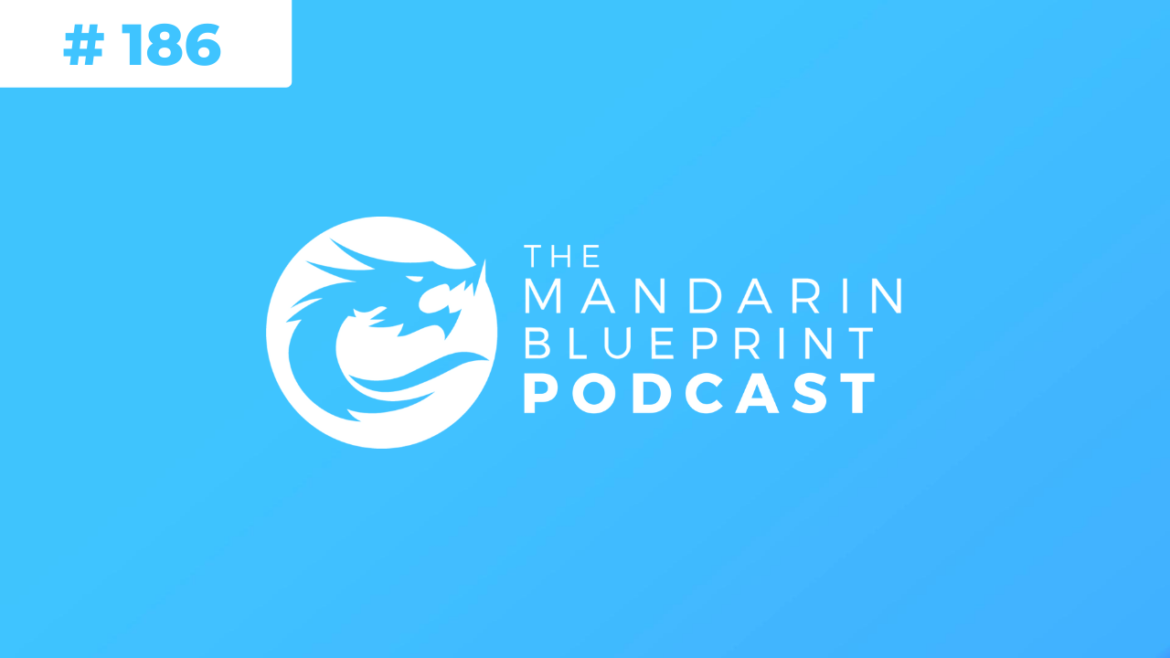
186. What You NEED to BELIEVE to Learn Chinese
欢迎光临! Welcome!
You can now subscribe to the podcast by the links below, or you can subscribe by copying the following URL into your favorite podcast APP.
The Mandarin Blueprint Podcast focuses primarily on The Blueprint online curriculum. Creators Luke Neale & Phil Crimmins answer questions and comments, discuss topics related to China and Mandarin learning, and have special guests.
Want to learn how to speak fluent Chinese fast? Join our free Webinar right here.
0:00 Affiliate Link & Reviews
Become a Mandarin Blueprint Affiliate
Leave us a Google Business Review 🙂
2:00 The Chain of Beliefs You Need to Learn Mandarin Chinese
你们好 Friends,
Phil here.
Thanks to the magical writing of André Chaperon, I learned about a concept he calls the “Chain of Beliefs” to inspire action from people.
In André’s context, he’s trying to help people better market their products online, but a few days ago, it hit me like a brick that this “Chain of Beliefs” concept applies perfectly to Mandarin mastery.
But why do we need a “chain” of beliefs?
To help explain why we need a “chain” of beliefs, we first must discuss your core belief.
Belief #1 – The Core Belief
Understanding messages is THE path to MandarinChinese acquisition.
This is your core belief because every other belief derives from this fundamental truth.
(Note: For the sake of brevity, we’re not going to try to prove why ‘understandable messages’ are so important in this article. If you’re curious, we’ve written at length about the most cited linguistic research)
Now, while this core belief is your most important belief, it also has a crucial problem:
It’s Not Actionable (Yet)
While it’s 100% true that you need to get understandable messages to achieve fluency and literacy in any language, it’s like saying to someone trying to lose weight, “burn more calories than you consume.”
True? Yes. Helpful? No.
The question that naturally arises is: “How do I understand messages when everything I hear is babble, and everything I see is incomprehensible squiggles?”
This is why we need a CHAIN of beliefs.
We need to get the core belief to be actionable, so let’s follow a chain of beliefs to get to real tangible gains.
Belief #2
Understandable messages can only come in via two places: My eyes and ears.
Belief #3
If I can’t understand what’s coming into my eyes and ears, I have to improve my ability to listen and read.
Belief #4
Therefore, there are only two core activities I should engage in to acquire Mandarin:
- Get understandable messages into my ears and eyes
- Improve my ability to listen and read
(And #2 is in service to #1)
Belief #5
The best way to improve my ability to hear and understand is to master pronunciation. If I can produce each sound, then I increase my ability to recognize that sound when others produce it. Recognition is the first step to understanding (core belief callback).
Belief #6
The best way to master pronunciation is to learn from non-native speakers who’ve already reached fluency.
Native speakers mastered pronunciation subconsciously as little kids, so they aren’t good at explaining how to produce sounds. Non-native speakers get the struggle and can tell you exactly how to master every sound.
Belief #7
The best way to improve my ability to see and understand is to learn Chinese characters.
If I can read Chinese, then my opportunities for understandable messages explode. This is the one true adult “hack” for acquisition.
Belief #8
I should AVOID learning Chinese characters by ROTE (i.e., writing over & over until memorized). It may work for Chinese kids who have ten years of public schooling, but it’s impractical for adults.
Belief #9
I SHOULD learn Chinese characters using a systemized visualization method. I’m bad at rote memorizing (as all humans are), but I’m good at remembering “POPA – People – Objects – Places – Actions.”
I will learn new characters in 30-60 seconds on average using this system.
Belief #10
To understand messages, I must remember what I’ve learned (pronunciation and characters). Therefore, I should use SRS Flashcards to review everything.
Belief #11
I should learn characters in an Optimal Character Learning Order (OCLO). This will allow me to learn high-frequency vocabulary and read understandable sentences from zero in the shortest possible time.
Belief #12
Characters & Pronunciation are the “hard” parts of getting to understandable messages because once you know characters, Chinese words and grammar are straightforward to understand. Thus, I am wise to keep faith that the foundation-building with pay off with rapid gains later.
Belief #13
Once I’ve learned the top 500 characters and 1000 words, I’ll recognize 80% of the Chinese I see. Therefore, I should start immersing as much as possible in native content & graded readers. This will expose me to the most possible Understandable Messages Per Minute (UMPM).
Belief #14
As long as I continue to improve my ability through pronunciation practice & character learning, my UMPMs will continue to rise, and I will naturally want to express myself.
Belief #15
By following the above beliefs while practicing speaking & writing, there’s no reason I can’t become a fluent and literate Mandarin speaker.
A Mighty Chain
Belief is what inspires action in this world. Who says, “I only act on the things I don’t believe in”? Weirdos, that’s who.
Now listen, we’d be happy to elaborate on any of these beliefs (just email us!), but the best way to truly take them on is to take a hop of faith and start acting as if they are true.
It’s not a “leap” of faith. After all, there’s plenty of evidence that following this chain of beliefs really works.
However, the only way to truly prove that these beliefs are worth taking on is to feel the results yourself.
First, act as if they are true. Then you’ll know they are.
28:01 Comments & Emails
Ioanna Pappou by Community
大家好!
I am new here, so first let me greet everyone who is being here for long now! 你们好!
So, I have seen the video Phil did about multiple 3rd tones in a row and I’m here to ask about multiple 4rth tones in a raw!
Examples:
世界在进步 -> shi4 jie4 zai4 jin4 bu4
看样儿要下雨了 -> kan4 yangr4 yao4 xia4 yu3 le5
天像是要下雨的样子 -> tian1 xiang4 shi4 yao4 xia4 yu3 de5 yang4 zi5
How do you make the tone changes from 4rth to 2nd here, since there are more in a row!
Thanks so much!
Happy to be here!
Ioanna
32:06
Reno McK by Community
Regarding converting 3rd tone to second tones, when there are 3 in a row: 我想起来我说的话
Why is it: Wǒ xiángqǐ… (3,2,3)
and not: wó xiǎngqǐ… (2,3,3)When Im trying to figure out how to say the sentence, I seem to continually guess wrong. Is there a rule? Or is it whatever feels best? And that chunking “xiángqǐ” is more comfortable than chunking “wó xiǎng” together?
(I know I asked a similar question before, but it keeps cropping up and I thought I figured it out :P)
33:03
James Rogers by Email
Hey Luke and Phil you beautiful legends! Hope both of you are okay and it’s going well with babies and moves etc. Just a bit of an update on immersion. I’ve been using the Fluent Forever app now for a few months. I think it works pretty well. A plus side is you don’t have to spend the time mining sentences and it only take a minute to make a flash card. The disadvantage is that the content isn’t so relevant for you as an individual. I love the fact it keeps track of how many words you know. It really helps to mark progress and using pictures only is sooooo effective… especially as we have so many mental images from the MB course for characters already. Looking at sentences time and again like I did for much of the intermediate course in MB really helps you hear the words and get the tempo of the language. Aside from my character flashcard reviews that’s my only active study.
I’ve also been listening a lot to intermediate podcast, particularly TeaTime Chinese. It’s got a lot of interesting subjects on there and transcripts online so I can listen at work and then read them when I get home. I play them at 1.20x speed (which is adjustable in Audible) because otherwise they are too slow…which I never thought I’d say about someone speaking Chinese, lol. I actually find if the audio is too slow then I switch off as if it’s not engaging enough for my brain, is that common???? At a quicker speed I’m forced to let it wash over me and then pick out the gist…if it’s too slow I get hung up on words and not the overall meaning…or distracted by a squirrel in a nearby tree, lol.
I’ve had the chance to meet some Chinese people recently and order bubble tea and snacks in a place we found on holiday. For the first time I had 10 Chinese people look at me as if I was from another planet…while trying to pretend they weren’t staring, lol. It was a pretty cool feeling. I’m still focusing a lot more on listening than speaking but what I could say nobody struggled to understand. Nobody believes I’ve only been learning for a year and a half, feel free to take partial credit for that! I found even in a few days with a few interactions my confidence skyrocketed. On the last interaction I ordered in Chinese and was greeted with a barrage of full speed Chinese back…all I caught was 饮料…which was enough for me to ask my wife, ‘你喝什么?’ she had no idea what I meant but it brought me 5 seconds to think about the answer, lol.
I’m just wondering…when will the next levels of characters come out on the course…is there any chance of a level a month? I still find some characters I don’t know but think are probably fairly common…but I don’t want intensive study of characters again…or a flashcard burden so that would be a great pace (对我来说).
Thanks as always for the work guys
保重 (not sure if that works there…seems like it might, lol)
Jimmy
39:50
K C by Email
Hi Luke & Phil,
Tina here checking in.
I’ve just completed Level 26. It’s taken me about a year and a half. I’m taking the slow and steady approach, which is what works for me and keeps me consistent. Even if life throws some big things at me, like illness and a minor surgery, I have never missed a day of flashcards yet. On better days I do a handful of MB lessons.
I’ve had a couple chances to practice speaking, which has been rewarding. When I woke up from my surgery, I noticed my nurse’s name tag, and asked her ”你会说中文吗?“ She did, and we had a small conversation! I think it’s amusing and kind of fantastic that my groggy post-anethesia brain wanted to speak Chinese the first chance it got.
Last week I found a tiny teashop in New York City’s Chinatown. I spoke with the owner for quite a while, completely in Mandarin. For sure we had to use some gesturing and pointing at pictures, but I did not have to reach for Google translate once.
Doing the MB lessons and flashcards everyday, my progress can feel invisible. Having that conversation showed me that this is really happening. I CAN speak a little Mandarin! I AM progressing! Laoban was impressed that I’ve only been studying for a year and a half too.
My victory is your victory. Thank you so much for developing these courses. They really work!
In all honesty, I’m not that great about doing the passive listening, or reviewing the full dialogues and stories that come at the end of a level. Thanks for making the whole-level sentence recordings available. That does help. I was having trouble in iTunes / Apple Music with the individual files which made me not want to play them. I’m thinking of making flashcards for the stories, even though they’re long, just to get them into my flashcard workflow. It’ll probably be better when I get into the passive listening again too.
I do watch 1-2 hours of Chinese tv a day. So I am getting some listening practice in that way. And learning context. My ears do pick up words and phrases I’ve just learned.
An update on my approach to learning traditional characters: At the end of a level, I make flashcards for all the traditional hanzi, and leave the cards turned off. Every so often I scan through the list and see if there are any easy ones based on the props I know, then I turn those on. My goal with traditional is to be able to text my taiwanese friends, and to be able to read signs and menus the next time I visit Taiwan. I will complete your courses with simplified hanzi. I also have friends in China and would love to travel there again too, so knowing both is advantageous to me. Again, my slow and steady approach is what is working for me.
Thank you again. The progress I’m making through your courses is something I’m really proud of.
Tina
46:25
Andy Williams on Vocab Unlocked from 满
In the word 满足, 足 means enough. How is it different from 够?
49:35
Kelli on BONUS: “How Does What” – Adverbs of Denial
不要 was always taught to me as kind of harsh and that 不用 was preferred, however I’ve learnt most of my Chinese in Taiwan. Just curious if this is also true of 大陆.
51:34
Francislainy Campos on Vocab Unlocked from 界
Struggling to see the role 与 plays on 大海切断了他们与外界的联系. If you can please clarify that? Thank you.
52:48
Annette Bicknell on Vocab Unlocked from 材
你的身材真好,你经常吃牛肉吗?A little cultural context might be needed to truly understand the implication of such a statement. Is it because meat historically was unaffordable for the general population and not eating a proper non-meat diet caused malnutrition?
54:54
Isabelle A on 为什么 in Context
我想学好汉语,然后我就可以在中国找工作了。
What’s the meaning of 好 before 汉语? Does it literally mean, “I want to learn Chinese well”?
And what is the purpose of 就 here?
57:52
Isabelle A on 云 in Context
早上天空没有一点云.
Could you say 早上天空没有云 without the 一点?


